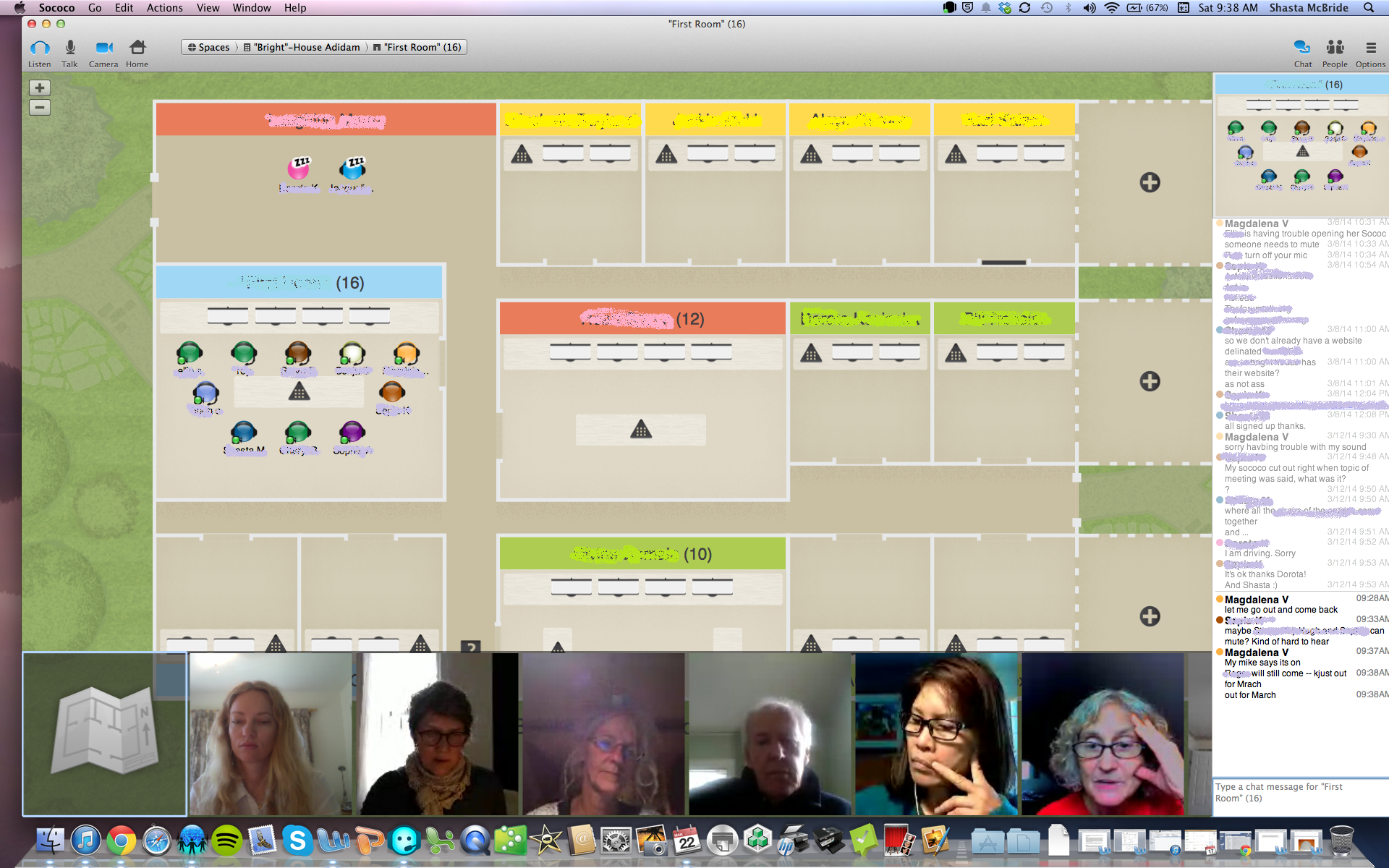Yikes, sorry for the late reply, everyone! I am a volunteer, and the only write-up made was for a report at the very top-level that would not have included the kind of detail I share here.
Where to start?
I don't have pictures of the first training event, but we are already working on the training for the next set of interviewers. Apparently, the first set of folks was so enthusiastic that other people started to line up wanting to know if they could just walk in. Not enough managers and trainers to go around and also manage the project and current set of interviewers, so we're scheduling the next training as a proving ground for Training the Trainer. I guess that will be my next major post.
Attached is a picture of a different community meeting I take part in every week using the same technology that I mentioned earlier .
.
As you can see, we can do breakout rooms in Sococo. The 6 faces you see in the picture are just a few of the 10 people meeting. That's me, with dark hair, second from right.
Of course, for the training, the faces are different, the map showing where everybody is shows different groups of individuals.For the ABCD training, the breakout feature came in very handily when, for example, I asked the trainees to pair off and interview one another for the introductions or divide into sets of four or five people and talk about institutions and associations. Each group could use the Chat function as a flipchart to write down key words from what people had to say, then they would copy the material and when we came back into the main room they could paste into the Main Room's Chat and report out. The virtual arrangement was not as dynamic as having everybody in the same room buzzing away, but it gave trainees a sense of movement and a feeling of security about being heard and getting comfortable with the technology at least. The participants came from Europe, Australia and New Zealand, and North America.
The interviews are going very slowly but steadily as the interviewers are all adults with busy lives. For me, ABCD feeds my appetite for empowering others. And doing it it fits in with the philosophy of the sacredness of the herd that I have learned about over the years. (Reference site: http://sacredcamelgardens.com/)
I identify with being a herd leader -- the animal somewhere in the background staying aware in the moment of the entire herd. I continue to look for leaders and ways to shift responsibility for this projectto others who are capable. For example, now that I've completed the first training, I'm in the process of moving the project managers to learn how to do the training, even as Ialso keep checking in on the trainees and project managers. Even though we are all volunteers, I make sure to keep our roles clear--as the project managers, they handle all the logistics and go through Train the Trainers themselves. As the initial trainer, I trained the first batch of interviewers and consult on the handling of the project.
It's kind of brassy of me, as I haven't been a formal student of ABCD. However, I believe ABCD is critical for us and since I was already doing a different major function elsewhere in the community and I have many other projects elsewhere, because that's just the kind of person I am, we're all pitching in to keep things moving and it's my responsibility to myself to set my boundaries. The work all you ABCD professionals are doing is a blessing to the world.
I will start a different post on the Training the Trainers I'm doing so this doesn't stretch out so much.
As far as outcomes and what more others are saying besides getting new interviewers, this ABCD project is one of two that I have heard be acknowledged by some leaders as something positive that's occurring in the community no matter how small.
Yesterday, my husband and I had a guest visiting from DC who we hadn't seen in a few years and who is also close friends with one of the managers of this ABCD project. Our friend has run several businesses and has been active in community initiatives there.My husband tried to tell him about ABCD as he is also using it but for a project in a different community and for a different purpose. At the end of his explanation, my husband also pointed out to our friend that this was the same work that I was trying to do with the manager we all knew. The man exclaimed, "Oh, now I get what she has been trying to tell me and why she's so excited!" So I challenged him to articulate what he thought he understood. He said, "You're trying to identify our resources." Simple as that, and now I know he will support it.
In terms of outcomes, I used to sit on local citizen committees for the United Way and it was one of the ways I learned about the importance of outcomes. So far we are still trying to get through a certain number of interviews and I have had to remind these managers to share this information with their team as a way to keep folks fired up. I guess the fact that we have more interviewers to train without having campaigned for them is a sign of some community spirit re-emerging.
Thanks for the questions, and I'll keep reporting as I can.

 .
. , and will let you all know how that actually works out.
, and will let you all know how that actually works out.
